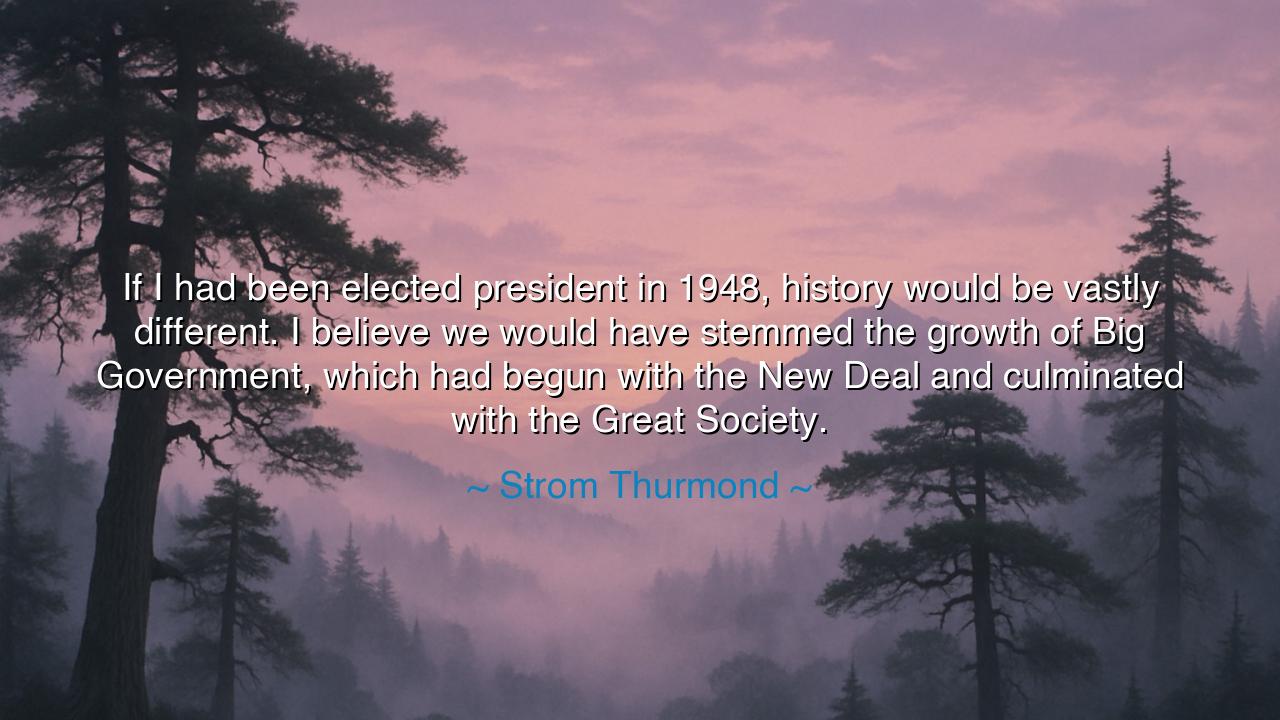
If I had been elected president in 1948, history would be vastly
If I had been elected president in 1948, history would be vastly different. I believe we would have stemmed the growth of Big Government, which had begun with the New Deal and culminated with the Great Society.






In the echoing chambers of American memory, where ambition meets the weight of destiny, the Southern statesman Strom Thurmond once declared:
"If I had been elected president in 1948, history would be vastly different. I believe we would have stemmed the growth of Big Government, which had begun with the New Deal and culminated with the Great Society."
These words, proud and defiant, flow from a man who saw himself as a guardian of a vanishing order — one who stood upon the shifting ground of a nation in transformation. Beneath their surface lies a struggle older than any single era: the contest between freedom and authority, individual will and collective power, the citizen and the state. Thurmond’s lament was not merely political; it was philosophical — the cry of one who feared that the power of government, once unleashed, would grow like a storm that consumes its maker.
To understand this utterance, one must return to the fires of the Great Depression, when the American people, battered by hunger and despair, turned to Franklin Delano Roosevelt and his New Deal. In that age, the hand of the state reached forth to rebuild what had fallen — to feed the poor, to employ the jobless, to restore faith in a trembling nation. Yet what began as mercy became, in the eyes of some, the birth of Big Government — an ever-expanding force that sought not only to save but to guide, not only to protect but to command. To men like Thurmond, this new order marked a departure from the rugged individualism upon which they believed America was built.
He spoke from the vantage of 1948, when the world was weary from war, and the United States was awakening to its global might. Yet beneath the glory of victory lay unease. The federal power that had mobilized armies and industry had also grown roots in the soil of daily life. The Great Society that would follow under Lyndon B. Johnson — with its crusade against poverty and injustice — would, in Thurmond’s view, complete the transformation from a republic of states into a nation of dependents. His words, therefore, were not merely the dream of a lost election but the reflection of a deeper anxiety: that liberty, once surrendered to benevolence, is rarely reclaimed.
But history, impartial and stern, shows that truth lies in tension. For the New Deal and the Great Society, though heavy with bureaucracy, lifted millions from destitution, gave the old and the sick a measure of dignity, and expanded the promise of citizenship to those long excluded. The very Big Government that Thurmond opposed became, to others, the instrument of justice — the bridge that carried the powerless across the river of inequality. Yet, like all power, it was double-edged. The same system that fed the poor could stifle the enterprising; the same laws that protected rights could encroach upon freedom. In this paradox lies the eternal question: How much must the people yield to the state before they cease to be free?
Consider the tale of Rome, that ancient mirror of all empires. In her youth, she was a republic fierce in independence, ruled by citizens who bore the burdens of their own defense. But as wealth and need grew, the people cried for bread, for safety, for ease. The state obliged — building armies, distributing grain, constructing monuments of order and control. And as the government grew mighty, the people grew passive. The republic gave way to empire, and the citizens, once masters, became subjects. The lesson is eternal: that comfort bought with liberty is the most expensive bargain of all.
Thurmond, with his flaws and convictions, spoke from this ancient fear — the belief that the more government promises, the less the citizen becomes. Yet his vision was bound to his time, to a South still entangled in its own injustices, where the cry for small government often masked resistance to equality. His warning, though, transcends even his own intent. For across the ages, rulers and citizens alike must ask: how do we preserve both justice and liberty, both compassion and independence? Too little government breeds chaos; too much, tyranny.
So let this be the teaching drawn from his words: Freedom demands discipline. A people cannot be free who will not bear responsibility for their own lives. Nor can a government be righteous if it forgets that its power flows from the consent of the governed, not from its own virtue. The wise must therefore walk the middle path — neither scorning government’s duty to aid, nor surrendering entirely to its embrace.
Let each generation ask itself anew: are we governed by our laws, or by our appetites? Do we seek a state that empowers citizens, or one that replaces them? For the fate of liberty lies not in the hands of rulers, but in the hearts of the ruled.
Thus ends the teaching: government should serve man, not shape him — lest in saving us, it unmake us.






AAdministratorAdministrator
Welcome, honored guests. Please leave a comment, we will respond soon